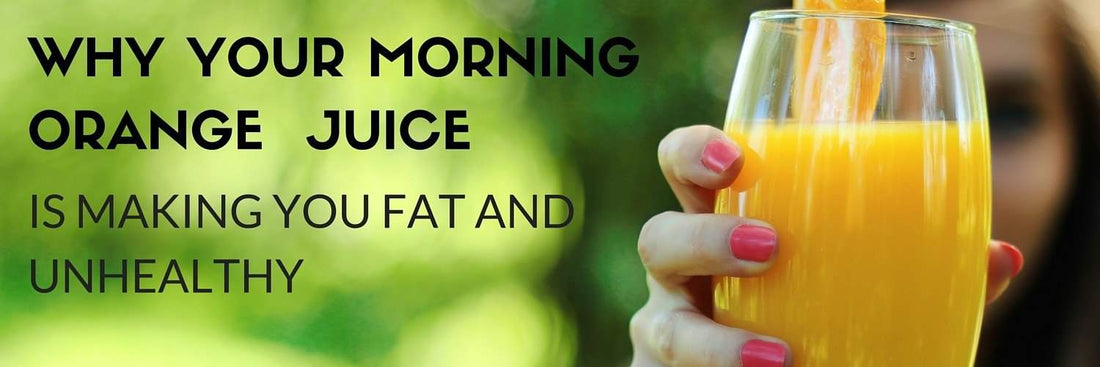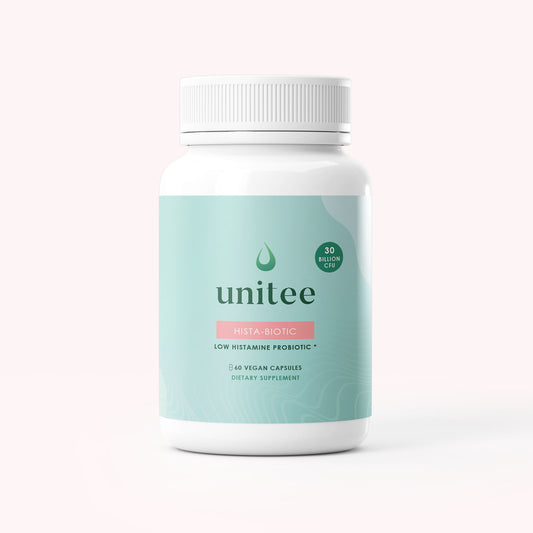Have you been juicing like a good little boy or girl in order to improve your health?
Do you continue to experience bloating and digestive symptoms despite all of your juice-filled efforts?
Are juicing and bloating two consistent players in your life that are supposed to be polar opposites, yet still seem to go hand-in-hand?
Today I’m going to expose the truth behind one of the biggest fads in the health industry that may be contributing to your bloating and digestive health issues: juicing.
Juicing and Bloating
Since we were young, fruits and vegetables were regarded as the healthy options over sugary snacks and potato chips.
While this is definitely true for vegetables (spoiler: juicing vegetables is just fine!), fruits have a little bit more of a complex backstory. What once was a healthy treat has now been modified, misused and abused in our society to become something that is actually contributing to unwanted weight gain, bloating and digestive health problems.

I’m sure you’re wondering how it’s possible that juicing and bloating are related. And how fruit, a beautiful gift from Mother Nature, can actually be a bloat-promoter and digestive-damager. Well my friends, the answer lies in fructose.
Fructose: An “All-Natural” Killer
Have you ever noticed how people say fruit sugar is good for you because its a “natural sugar”?
Have you also noticed how demonized high fructose corn syrup has become, with clear recognition of its detrimental health effects?
Well, these natural fruit sugars and high fructose corn syrup have one very big thing in common: they’re both fructose.
Fructose is a really interesting sugar, because it doesn’t impact our body in the same way that glucose does, and it gets processed in a different way by the liver.
Let me explain:
Fructose can only be metabolized by the liver. When fructose enters hepatic (liver) metabolism, it actually ends up entering the same metabolic pathway as ethanol and producing the same toxic compounds. That’s right, it literally has the equivalent impact to consuming alcohol, and acts as a poison in our bodies. No exaggeration. In fact, one of the most ground-breaking lectures I’ve seen was by University of California Professor of Pediatrics, Dr. Robert Lustig, MD, which discusses this very subject in great detail. I highly recommend you to watch this video, and guarantee it will change your outlook on “natural sugars”.
The outcome of fructose entering hepatic metabolism and behaving the same as alcohol is predictable: over-consumption can damage your liver. Not only is the liver the central detoxifier of your body and detrimentally important for an array of other biological functions, but it is also directly participates in food breakdown through bile secretion. Therefore, hindered liver functioning = hindered digestion = bloating following meals. You can read more about how this process influences bloating here.
Another significant consideration is that fructose results in the production of advanced glycation end-products (AGEs), which have shown to promote inflammation and oxidative stress 1 , two processes related to cellular damage and aging. AGEs have also shown to reduce insulin sensitivity in mice 2, 3 , therefore necessitating increased synthesis of insulin in response to a meal, which results in increased fat storage. All of these processes are well known to contribute both individually and in combination to metabolic syndrome and chronic disorders involving digestion 4,5 .
This is why high fructose corn syrup has come to be recognized as so damaging to your health.
So why isn’t fruit itself dangerous?
Well, when eaten whole, fruit contains large amounts of fiber that slow the release and metabolism of fructose, and actually allow your body to have sustained energy that can be utilized before entering hepatic metabolism. This means that you minimize both the amount of toxic metabolites produced (during liver metabolism) and the poisonous effect on your body, while obtaining the nutritional benefits of consuming fruit itself. In other words – fiber is the antidote.
The problem comes when we begin getting swept away with unqualified health gurus advocating to drink obscene amounts of freshly pressed or blended fruit juices in which all of the fiber is removed. Let me be very clear, because this is important: blending and juicing fruits destroys the fiber but retains the fructose content. This essentially means that we’ve removed the antidote but retained the poison. Since this removal of fiber means that the body is too over-loaded with fructose to immediately use it as energy (unless you’re a mid-competition high-performance athlete), fruit juices pass through the same harmful channels of hepatic metabolism and actually have the same biochemical effect on your body as drinking any other high-fructose-corn-syrup-sweetened drink, like Coke or Sprite, thus damaging the liver and therefore digestive processes.

In fact, according to the websites for Minute Maid and Coca Cola, an 8-oz glass of pure squeezed orange juice contains nearly equivalent amounts of sugar to an 8-oz can of Coca Cola, thus highlighting the dangerous levels of fructose within these supposedly healthy products.
So next time you’re having brunch and craving a Coke but decide to substitute it for a “healthy” glass of orange juice – think again. Either avoid these beverages all together or treat yourself to that Coke and ditch the sugar for the rest of the week.
How Can I Know What to Eat?
Every time I have the fructose conversation with people, the response is always the same: panic, denial, frustration. How is it that fruit is not okay anymore? What is left to eat?
My website was created with the initial goal of dispelling health and fitness myths, and pushing against the unethical marketing and lack of honest, scientifically-backed information available to the public.
Although this means that you may have to let go of some of the beliefs you’ve held onto for years (even since childhood!), the good news is that you have a published nutritionist and expert on eating right here to give you all of the answers!
Six Rules for Consuming Fructose
As we’ve discussed, the inclusion of fructose in your diet can be complex, and what was once an all-positive relationship with fruit has turned sour through the processing and misuse of natural sugars in our diets.
So, today I’m going to fill you in on six rules for maintaining a positive relationship with fruit and natural sugars, while simultaneously optimizing your health and nutritional status:
1. Consider fruits as part of your daily sugar intake – People often forget to account for fruits when considering their total daily sugar intake. As you’ve seen today, excess fructose can be highly damaging to your body, and is not something to be dismissed or considered “unlimited” in your diet. Whatever form sugar comes in (natural or processed) it’s all necessary to account for!
2. Avoid fruit juices – Consuming fruit juice not only has a dangerous effect on the liver and body as a whole, but the high-sugar beverage makes it frighteningly easy to exceed your daily sugar limits. This combination is a sure-fire way of contributing to deteriorated health status over time.
3. Don’t be fooled by marketing – Any processed or packaged foods that state that they contain “no added sugar”, are “all-natural” or “sweetened with fruit” should ring alarm bells. As I’ve demonstrated today, natural isn’t always synonymous with health and can in fact be just as bad as junk food alternatives. Always check the labels and don’t be fooled by vague nutritional claims.
4. Eat fruits whole – As I mentioned, the fiber in fruit provides the antidote to combat the harmful effects of fructose. Aim for high-fiber, low-fructose fruits such as raspberries and blackberries to maximize the health benefits.

5. Avoid dried fruit – Although dried fruit does contain plenty of fiber, they are an exception to the above rule. This is because all of the water has been removed during the dehydrating process, thus turning an entire serving of fruit into a bite-sized high fructose snack – just take a look at the sugar content next time and you may be unpleasantly surprised!
6. Eat organic, non-GMO fruit when possible – Due to the fact that genetic modification is able to produce larger produce in combination with the use of nutrient-depleted soils used in large-scale farming, fruit isn’t nearly as healthy as it should be and actually lacks a lot of nutrients. This means that we’re eating more food that is less nutritious, while still containing plenty of sugar. Studies have shown that organic produce contains much higher levels of several nutrients, therefore maximizing the health and nutritional benefits obtained from consuming whole fruits.
I’m sure for many of you this article may have challenged your current thoughts about fruit and natural sugars. However, my hopes are that with the evidence and eye-opening lecture I’ve provided, you will begin to see that there is absolutely no denying the detrimental effects of fructose on your health.
I encourage you to learn more about “The Bitter Truth” and start eliminating harmful sources of fructose from your diets. Here’s to a fruit-juice-free Friday! Let me know how it goes in the comments below! 😀
Health begins in the gut,
Anita Tee, MSc, BSc, PTS
MSc Personalized Nutrition; BSc Genetic & Molecular Biology
Personal Training Specialist; Canadian Register of Exercise and Fitness Professionals
References
1. Uribarri J e. Circulating glycotoxins and dietary advanced glycation endproducts: two links to inflammatory response, oxidative stress, and aging. – PubMed – NCBI [Internet]. Ncbi.nlm.nih.gov. 2016 [cited 20 May 2016]. Available from: https://www.ncbi.nlm.nih.gov/pubmed/17452738
2. Sandu O, Song K, Cai W, Zheng F, Uribarri J, Vlassara H. Insulin Resistance and Type 2 Diabetes in High-Fat-Fed Mice Are Linked to High Glycotoxin Intake. Diabetes. 2005;54(8):2314-2319.
3. Hofmann S, Dong H, Li Z, Cai W, Altomonte J, Thung S et al. Improved Insulin Sensitivity Is Associated With Restricted Intake of Dietary Glycoxidation Products in the db/db Mouse. Diabetes. 2002;51(7):2082-2089.
4. Pinkas Aschner M. Advanced Glycation End-Products and Their Receptors: Related Pathologies, Recent Therapeutic Strategies, and a Potential Model for Future Neurodegeneration Studies. Chem Res Toxicol. 2016;29(5):707-714.
5. Pugazhenthi S, Qin L, Reddy P. Common Neurodegenerative Pathways in Obesity, Diabetes, and Alzheimer’s Disease. Biochimica et Biophysica Acta (BBA) – Molecular Basis of Disease. 2016;.

Anita Tee
My name is Anita Tee. I'm a nutritional scientist who specializes in histamine intolerance. I hold a Master of Science in Personalized Nutrition and a Bachelor of Science in Human Biology and Psychology. For the past ten years, I have used my experience in nutritional and medical health sciences to create a scientifically backed, natural approach to healthcare that relies 100% on evidence-based research. As I previously suffered from - and overcame - histamine intolerance, my focus is to increase recognition and expand the available resources and protocols available for resolving this particular disorder. To date, I have helped over 4,000 individuals fully resolve or better manage their histamine intolerance symptoms.







